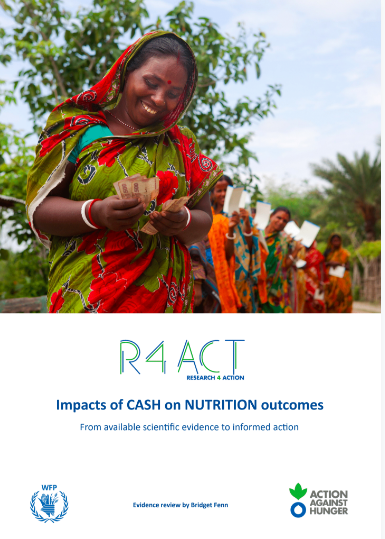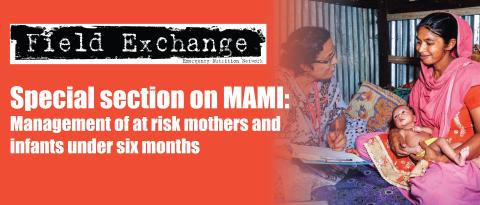Paving the way from research to action: cash and nutrition
By Stephanie Stern
Stephanie Stern leads Action Against Hunger Knowledge LAB, which explores innovative ways to facilitate knowledge uptake. She works to ensure that evidence produced is tailored to users’ needs, ‘ready to use’ and easily accessible, and facilitates and supports the design of innovative tools and methodologies to reinforce the link between research and programmes and policies.
 Translating scientific evidence into tangible, useable information to support evidence-based programming is an ongoing challenge for researchers and humanitarian practitioners. Since 2007, when Action Against Hunger began to engage in research, it has continuously explored efficient ways of linking research to action. In 2017, it launched the R4ACT – Research 4 Action methodology – with two main goals: (1) to simplify the understanding of research findings by producing a ready-to-use synthetic state of evidence on a chosen topic in a limited time frame; and (2) to support key stakeholders in the process of using this evidence in policy and programming. Scientific, programmatic and uptake perspectives are systematically taken into account at all the key stages of the methodology to ensure that scientific evidence is robust, practical and accessible.
Translating scientific evidence into tangible, useable information to support evidence-based programming is an ongoing challenge for researchers and humanitarian practitioners. Since 2007, when Action Against Hunger began to engage in research, it has continuously explored efficient ways of linking research to action. In 2017, it launched the R4ACT – Research 4 Action methodology – with two main goals: (1) to simplify the understanding of research findings by producing a ready-to-use synthetic state of evidence on a chosen topic in a limited time frame; and (2) to support key stakeholders in the process of using this evidence in policy and programming. Scientific, programmatic and uptake perspectives are systematically taken into account at all the key stages of the methodology to ensure that scientific evidence is robust, practical and accessible.
The first pilot was developed in 2017, in partnership with the World Food Programme (WFP), focusing on the impacts of cash on nutrition. The ‘ready-to-use state of evidence’ on cash and nutrition was produced in collaboration with a steering committee composed of technical, research and uptake experts on cash and nutrition. This report summarised available evidence on the impact of cash on anthropometric indicators and the impact of design and implementation of cash programmes on nutrition outcomes. Findings were presented in tables rather than in a long narrative to facilitate easy reading.
The second stage of the methodology focused on engaging with evidence. A group was set up of 12 key stakeholders engaged in cash and/or nutrition programming and policy formation. Stakeholders were selected with care to ensure diversity of points of view and stimulate cross-sector and cross-organisational synergies. Representatives were included from Action Against Hunger, WFP, the Cash Learning Partnership, CashCap, ENN, United Nations Food and Agricultural Organization, Ministry of Health Nigeria, International Committee of the Red Cross, John Hopkins University, Save the Children, United Nations High Commission for Refugees and the United States Agency for International Development. The group discussed key findings of the state of evidence and each member produced three related recommendations. During a one-day workshop these recommendations were pulled together, discussed and prioritised. The resulting shortlist of key recommendations was then translated into practical actions.
The full report and executive summary describe the methodology and key findings of this first R4ACT pilot. It is available here.
The next R4ACT will focus on the impacts of water, sanitation and hygiene (WASH) on nutrition outcomes, with a planned workshop in December 2018.
For more information, contact Stephanie Stern, Action Against Hunger Knowledge Lab lead manager.


